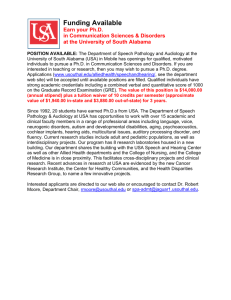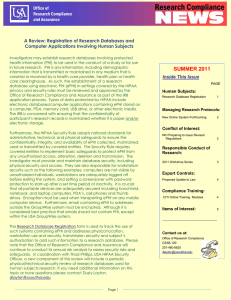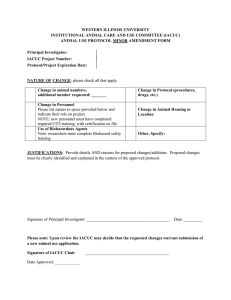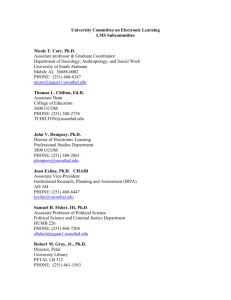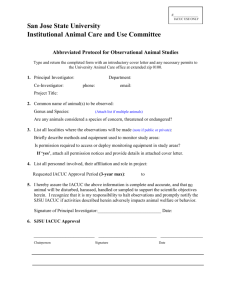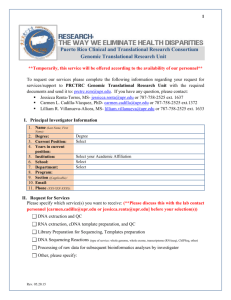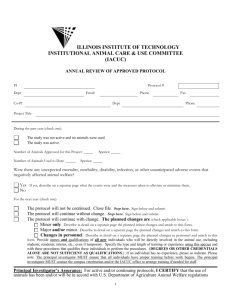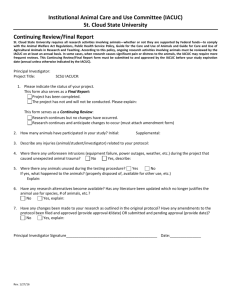Document 11129959
advertisement
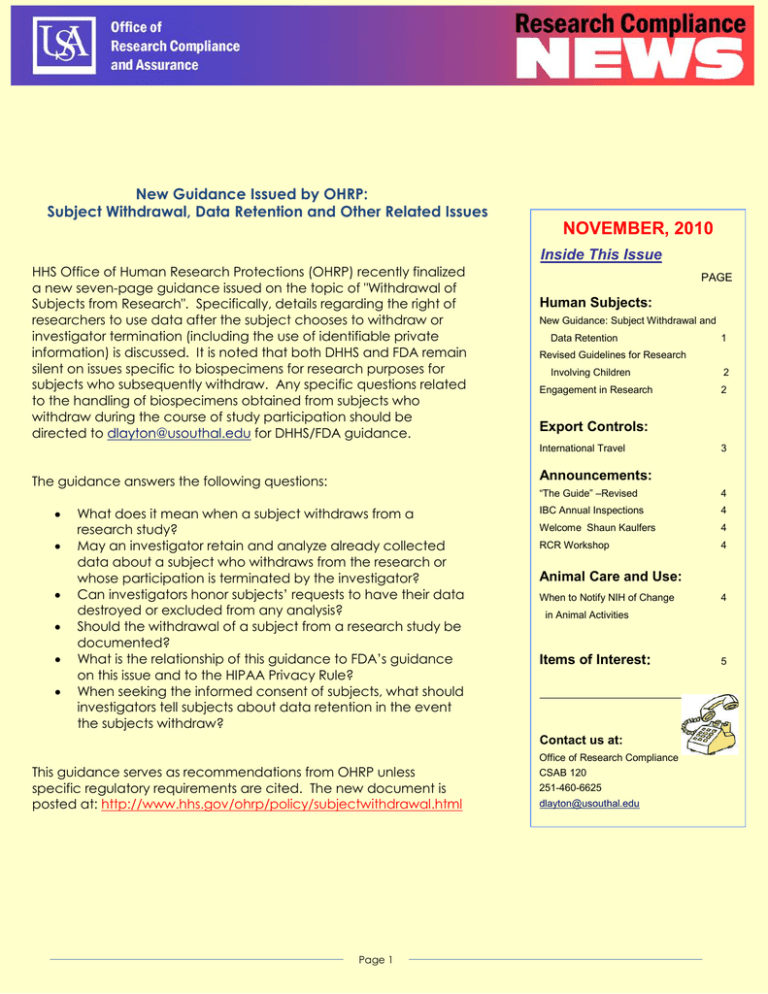
New Guidance Issued by OHRP: Subject Withdrawal, Data Retention and Other Related Issues NOVEMBER, 2010 HHS Office of Human Research Protections (OHRP) recently finalized a new seven-page guidance issued on the topic of "Withdrawal of Subjects from Research". Specifically, details regarding the right of researchers to use data after the subject chooses to withdraw or investigator termination (including the use of identifiable private information) is discussed. It is noted that both DHHS and FDA remain silent on issues specific to biospecimens for research purposes for subjects who subsequently withdraw. Any specific questions related to the handling of biospecimens obtained from subjects who withdraw during the course of study participation should be directed to dlayton@usouthal.edu for DHHS/FDA guidance. Inside This Issue PAGE Human Subjects: New Guidance: Subject Withdrawal and Data Retention Involving Children Engagement in Research • • • • 2 3 Announcements: The guidance answers the following questions: • 2 Export Controls: International Travel • 1 Revised Guidelines for Research What does it mean when a subject withdraws from a research study? May an investigator retain and analyze already collected data about a subject who withdraws from the research or whose participation is terminated by the investigator? Can investigators honor subjects’ requests to have their data destroyed or excluded from any analysis? Should the withdrawal of a subject from a research study be documented? What is the relationship of this guidance to FDA’s guidance on this issue and to the HIPAA Privacy Rule? When seeking the informed consent of subjects, what should investigators tell subjects about data retention in the event the subjects withdraw? “The Guide” –Revised 4 IBC Annual Inspections 4 Welcome Shaun Kaulfers 4 RCR Workshop 4 Animal Care and Use: When to Notify NIH of Change in Animal Activities Items of Interest: Contact us at: This guidance serves as recommendations from OHRP unless specific regulatory requirements are cited. The new document is posted at: http://www.hhs.gov/ohrp/policy/subjectwithdrawal.html Page 1 4 Office of Research Compliance CSAB 120 251-460-6625 dlayton@usouthal.edu 5 Revised Guidelines for Research Involving Children in Clinical Investigations The American Academy of Pediatrics (AAP) issued new guidelines designed to better protect children as research subjects. The new document focuses on the necessity of a safety plan during all phases of clinical trial and emphasizes the importance of an independent data and safety monitoring committee for all phase 3 trials. Data-monitoring mechanisms help ensure that a study can be terminated in a timely manner should an unexpected hazard be identified. The Office of Research Compliance and the IRB has approved to make revisions to the Investigator Checklist for Research Involving Children regarding standards for monitoring safety during a study. These changes call for PI’s to adopt a data safety monitoring plan for phase 1 and 2 drug trials without a Data Safety Monitoring Board (DSMB) in place. For phase 3 trials, if a DSMB is not required by the FDA, the IRB strongly recommends initiation of such a group. For more information on the AAP guidelines go to: http://pediatrics.aappublications.org/cgi/reprint/125/4/850 When is an Institution Considered to Be Engaged in Research? REMINDER: If the PI of a project is unavailable to conduct research, as when on extended leave, there is a responsibility to make arrangements for another investigator to assume all responsibilities for the study. These modifications must be submitted as a change in PI of the project and approved prior to implementation The DHHS Office of Human Research Protections (OHRP) has clarified in a revision to the frequently asked question regarding “engagement in research”. Any institution which receives a direct award from the DHHS to carry out non-exempt human research is automatically considered to be "engaged". This applies even where all activities involving human subjects are carried out by a subcontractor or collaborator. In general, an institution is considered to be engaged in human subject’s research when its employees or agents: • • • obtain data about living individuals for research purposes through intervention or interaction with them, obtain individually identifiable private information for research purposes (45 CFR 46.102(d),(f)) http://www.hhs.gov/ohrp/humansubjects/guidance/45cfr46.htm#46.102; or obtain the informed consent of human subjects. Employees and agents, including students, are individuals performing institutionally designated activities and acting on behalf of the institution or exercising institutional authority or responsibility. In general, simply informing potential subjects about a research study is not considered engagement in research. Also, providing written information about a research study, including how to contact the investigators for information and enrollment, and seeking and obtaining prospective subjects' permission for investigators to contact them are not considered engagement in research. On the other hand, if one is seeking informed consent from a research participant then this activity would be considered engagement in research. For specific details, go to DHHS OHRP’s guidance on this topic at: http://www.hhs.gov/ohrp/humansubjects/guidance/engage08.html Page 2 QUESTIONS, QUESTIONS, QUESTIONS! LET ME GET ON WITH MY TRIP! The international travel policy and processes is a bit different than in years past, in particular with questions pertaining to export controls that may not seem to make a lot of sense. The majority of the International Travel Review Form is fairly straight forward listing out your basic information, where you are going, what you will be attending, etc. At the top of the second page are a series of questions that pertain to federal export controls that may have a potential bearing on your business trip. For a closer look…. Will you be working with, faculty or students, educational institutions or businesses while traveling for your project? First of all, realize that any sort of communication that you have with any person that is not a United States citizen is considered to be exporting information to their country of origin. This includes those physically in the US, so it stands to reason it would apply if you are actually abroad. So, if you are travelling to present a paper or will be potentially discussing research it becomes important if what you are discussing is not covered by the fundamental research exemption. Even more slippery, what if someone you are meeting is listed on a Restricted Parties List by any one of numerous government agencies? It might seem farfetched, but there are thousands of people and businesses in the world with which it is illegal to contact or conduct business. These internal controls are implemented as measures for complying with export control laws. Will you be transporting any encrypted software /technology/items/data to or from a foreign country? Your smart phone is encrypted, Microsoft Office is encrypted, your iToys are encrypted, and so can you not carry them? Of course you can. Items that are available on the mass market generally have exemptions even if they happen have characteristics that would put them in the purview of export controls. But, what about the engineering software you use for your research? What about the new program you wrote? What about the software that you use to keep track of temperature readings on buoys that you placed in the Bay? What about???? If there is proprietary software on a computer or device that you are carrying with you there could be issues with taking the technology to another country, especially if you have technical information regarding it that you are carrying with you. Listing out software that you know to be encrypted, can allow us to research it for you to make sure you are allowed to take it with you. Will you be transporting any equipment/biological samples to or from a foreign country? As mentioned above, you would be amazed at the everyday items you own that are included in descriptions on the Commerce Control List and have an “Export Control Classification Number” or “ECCN.” It is the number used to identify an item as controlled and what is used in obtaining license for exporting it. Many times, the manufacturer has found the ECCN number even if the product is on the mass market and exempted. If not, we can help do it for you. Providing a list of samples or, as mentioned above, equipment that you intend to take on your trip helps us aid you in compliance with export control laws. The last place that you want to discover that the items you are transporting are in violation of the law is from a Customs agent at an airport. So, yes, the questions on the form may seem odd, but they provide for a screening mechanism in advance of your travels and potential protect you from unexpected hassles. We don’t want you, in any capacity, to get “caught” running up against these rules. Any questions? Contact Alison Henry at ahenry@usouthal.edu or 460-6509. Page 3 ♦ ♦ ANNOUNCEMENTS ♦ ♦ The Guide for the Care and Use of Laboratory Animals Revised The ILAR (Institute for Laboratory Animal Research) “Guide for the Care and Use of Laboratory Animals” has been revised and will be published in the near future. Once it is published, the IACUC will use it, in conjunction with other publications, to evaluate the Animal Care and Use Program at USA. Research Compliance Welcomes New Staff We are pleased to welcome Mr. Shaun Kaulfers as our IACUC Compliance Specialist. Shaun is available to assist you with your protocol submissions, training requirements, protocol approvals and general IACUC questions or concerns. He can be reached at 4606863 or skaulfers@usouthal.edu Stop by and welcome him to our Research Compliance team. IBC Inspection Dates Investigators who have active registrations with the Institutional Bio-safety Committee need to be aware that on December 13 and 14 the annual laboratory inspections will commence. Your designated date and time will be communicated to you after the Thanksgiving holiday. Please take a moment to look at your registrations and ensure that all personnel are updated and have completed biosafety training in the last year. A link to the training can be found here: http://www.southalabama.edu/rese archcompliance/biosafety.html When should you notify NIH of a change in an animal activity supported by PHS funds? All changes in animal activities requires the review and approval of the IACUC, however, keep in mind they may also required approval by NIH. Any significant change or change in scope would require notification to the NIH funding component. As defined by the NIH Grants Policy Statement, a change in scope refers to a change in direction, type of research or training from the objectives, purposes, or aims of the approved work. Examples includes in the Grants Policy Statement include change in specific aims, shift of research emphasis, substation of animal models, application of a new technology such as changing assay methods. Ultimately, consultation with NIH grants management personnel may need to be sought since not every change in animal model or RCR Training Workshop: use represents a change in scope. Please be aware that the IACUC is not responsible for notifying NIH of any changes. The request should be made in writing to the Ownership of the Results of Research funding component no less than 30 days before Presented by: Russ Lea, Ph.D., VP for Research the proposed change. The NIH Office of Laboratory Animal Welfare addresses this question at: December 14th 1:00-2:30 pm http://grants.nih.gov/grants/olaw/faqs.htm#b13 WHERE: University Main Library, rm 181 To register go to https://jagmail.usouthal.edu/cgibin/CA/seminar/semrca.cgi Page 4 * * * Items of Interest * * * What to tell the patient after a trial goes awry http://www.nytimes.com/2010/08/24/health/24alzheimers.html?_r=3&ref=the_vanishing_mind Promoting an ethical compass for the information age One researcher discusses the ethics of using social networking sites for research. Jeffrey M. Drazen, M.D., and Alastair J.J. Wood, M.D. “Don't Mess with the DSMB” N Engl J Med 2010; 363:477-478, July 29, 2010. http://www.nejm.org/doi/full/10.1056/NEJMe1007445 Gaps in Medical Research Ethics Laura Stark discusses what she believes are problems in the history of research ethics First Clinical Trial Begins for Stem Cell Therapy The first clinical trial of a therapy derived from human embryonic stem cells has begun. Researchers are testing a treatment for patients with spinal cord injuries for safety. Have a Question or a Comment? Dusty Layton Director, Research Compliance 460-6625 dlayton@usouthal.edu Alison Henry Assistant Director, Research Compliance 460-6509 ahenry@usouthal.edu SuzAnne Robbins IRB Compliance Specialist 460-6308 srobbins@usouthal.edu Shaun Kaulfers IACUC Compliance Specialist 460-6863 skaulfers@usouthal.edu Newsletter archives are posted on the Office of Research Compliance website at: http://www.southalabama.edu/com/research/ Page 5
